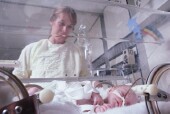- Could Artificial Sweeteners Be Aging the Brain Faster?
- Techniques for Soothing Your Nervous System
- Does the Water in Your House Smell Funny? Here’s Why
- Can a Daily Dose of Apple Cider Vinegar Actually Aid Weight Loss?
- 6 Health Beverages That Can Actually Spike Your Blood Sugar
- Treatment Options for Social Anxiety Disorder
- Understanding the Connection Between Anxiety and Depression
- How Daily Prunes Can Influence Cholesterol and Inflammation
- When to Take B12 for Better Absorption and Energy
- Epsom Salts: Health Benefits and Uses
Are Hospitals Overusing Neonatal Intensive Care?


A new report finds that more babies are being treated in neonatal intensive care units at many U.S. hospitals, and the infants are bigger and less premature.
While they don’t know for sure, researchers suggest this is a potential sign that these expensive interventions are being overused.
The report authors analyzed nearly 18 million births from 2007-2012, and found that the number of babies who were treated in neonatal intensive care units grew from 6.4 percent to 7.8 percent.
“An increase of this level over six years raises questions,” said study author Wade Harrison, an urban health scholar at Geisel School of Medicine at Dartmouth, in New Hampshire. “Infants admitted to the units are increasingly likely to be of normal birth weight. More than half of all admissions are for normal or high-birth weight newborns. This suggests the need for further study since the units were initially developed to care for the most premature infants.”
Neonatal intensive care units, or NICUs, have been used in the United States for more than 50 years. They’re designed to provide intensive care to infants with special medical needs, particularly those born prematurely.
But intensive care for babies is expensive and can come with risks of its own, Harrison said. On the medical side, X-rays, antibiotics and IVs can be harmful.
Also, providing unnecessary care can reduce bonding between parents and babies, make breast-feeding more difficult, and cause parental worry and stress, he added.
Meanwhile, Harrison said, there’s been a lack of research into neonatal intensive care as a whole because most studies only look at their treatment of babies with very low birth weights. In fact, any baby can undergo treatment in the units, he explained.
In the new study, researchers looked at births from 38 states and Washington D.C., in 2007 through 2012. More than 84 percent of infants with low birth weight were admitted, compared with 4 percent of those with normal birth weights.
But over time, the researchers found, newborns admitted to the units became larger and less premature.
What’s going on? The study doesn’t pinpoint an answer, but Harrison said possible causes include lower thresholds for admittance. The research didn’t indicate that the babies being admitted are sicker, although he acknowledged that the findings may have missed signs of that being the case.
What about fraud aimed at getting higher reimbursements for intensive care? It “was not something we were interested in examining nor could it be answered using the birth certificate data we used in the study,” Harrison said.
However, Dr. Robert White, a neonatologist in South Bend, Ind., said there’s only one reason for the higher number of very small babies being admitted to the unit: More are being resuscitated after birth and surviving.
As for babies of normal weight, he said there are a variety of reasons. For one, diabetic mothers are having babies with blood sugar problems that often require treatment in an intensive care unit. “Another cause of increased admission of term-infants is narcotic withdrawal,” he said, “now often due to prescribed” drugs.
Guidelines regarding the use of the units have also changed, he said. “An infant born at 34 weeks with no medical problems, for example, is now expected to be cared for in a neonatal intensive care unit, whereas that was less likely to be the case in the past.”
Still, he said, “we cannot ignore that perverse financial incentives still exist for both physicians and hospitals to provide care in a unit if it can be medically justified, even if it is not medically essential.”
What can parents do? If told that a baby needs care in one of these units, they should ask about a private room “where they can comfortably stay for as long as necessary with their baby,” White said.
These rooms allow families to stay with their newborn “at a crucial and stressful time and increase the family’s opportunity to take an active role in their baby’s care and medical decision-making,” White said.
More information
For more about premature babies, visit the March of Dimes.
Source: HealthDay
Copyright © 2026 HealthDay. All rights reserved.










